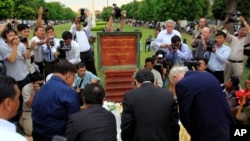While there are many issues for Cambodia’s journalists to cover these days—from the tensions with Vietnam over border issues to land disputes, the law to regulate NGOs, the labor sector and others—the country’s reporters are often disrupted from their work.
Sometimes reporters are simply pushed away from an event, or barred from covering it altogether. In other cases, they are threatened or attacked.
In early July, reporters were prohibited from interviewing opposition lawmaker Um Sam An, by the Assembly spokesman for the ruling Cambodian People’s Party, Chheang Von, inside the National Assembly area .
In August, two reporters from the Voice of Democracy, covering a protest outside City Hall, were kicked by city security guards, who also confiscated their cameras.
That same month, reporters in the town of Poipet, on the Thai border, were not allowed to cover a meeting involving the reshuffling of personnel there.
News organizations say such actions take away the public’s right to information and are an infringement of press freedoms.
“In a democratic society, there is not any hidden information such as this, because it can regress democracy in a country,” Sum Chan Kea, a coordinator for the local human rights group Adhoc in Banteay Meanchey province, said.
By the Press Law, reporters are protected by a truth clause, and they are supposed to be allowed to cover official meetings and statements—with the exception of National Assembly closed-door sessions.
Moeun Chhean Narridh, director of the Cambodian Institute for Media Studies, said fundamental freedoms are eroding in the country, not just for journalists, but for everyday citizens, as well. He compared Cambodia’s democratic process to a traditional dance: three steps forward, two steps back.
“Democracy in Cambodia seems to be very strange, because sometimes it seems to be loose, and sometimes it tends to be tense,” he said.
Pen Bona, president of the Club of Cambodian Journalists, says media are “fundamentally important to the democratic process.”
“Without media and a free press, our democratic society cannot perform freely, because they are interrelated,” he said. “When the finding of information has barriers, that eventually affects the democratic process, for sure.”
Pa Nguon Teang, executive director of the Cambodian Center for Independent Media, which houses the Voice of Democracy, said Cambodian media are divided between pro-government and independent. Restrictions tend to hit the latter.
“First, it is dangerous due to the poor governance,” he said. “Second, it shows the trend of discriminations in society and makes the country unable to move forward. Therefore, democracy development cannot move forward. As a result, the citizens are the victims.”
Despite such criticisms, Ouk Kimseng, an adviser to the Ministry of Information, said he remains optimistic about Cambodia’s democratic process. The government is trying to decrease restrictions on media, but reporters have to be responsible, too, he said. The ministry is working to prepare a new press law, “to ensure journalists and reporters can freely access information” within the confines of the law, he said.
Meanwhile, Cambodia’s international scoring for press freedom remains abysmal. Freedom House says Cambodia is a country where the press remains not free, and Reporters Without Borders ranks Cambodia’s press freedom 144th out of 180 countries.







